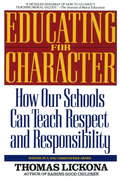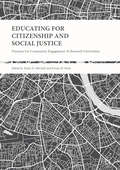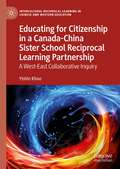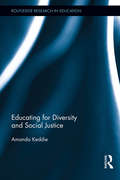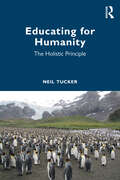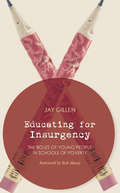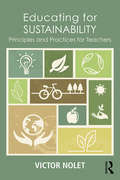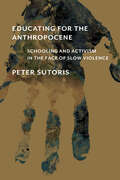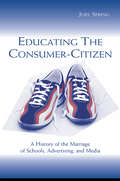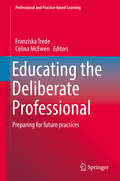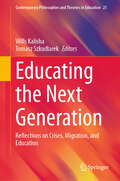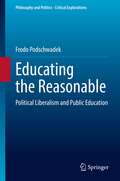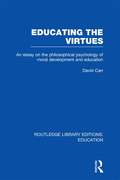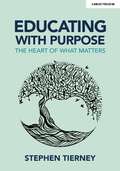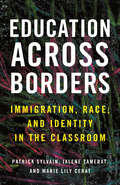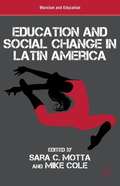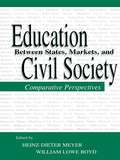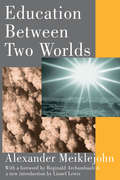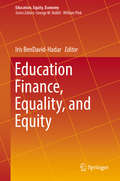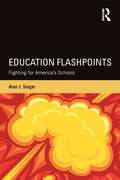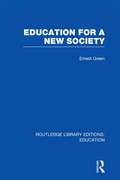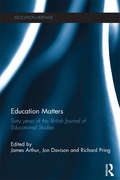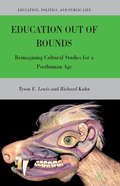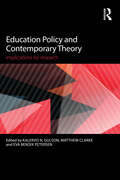- Table View
- List View
Educating for Character: How Our Schools Can Teach Respect and Responsibility
by Thomas LickonaCalls for renewed moral education in America's schools, offering dozens of programs schools can adopt to teach students respect, responsibility, hard work, and other values that should not be left to parents to teach.
Educating for Citizenship and Social Justice
by Krista M. Soria Tania D. MitchellIn this edited volume, authors explore the ways in which departments, programs, and centers at public research universities are working to better engage students in the work of citizenship and social justice. The chapters in this book illuminate the possibilities and challenges for developing community engagement experiences and provide evidence of the effects of these efforts on communities and undergraduate students' development of citizenship outcomes. This text reveals how important the integration of our intentions and actions are to create a community engaged practice aimed towards justice.
Educating for Citizenship in a Canada-China Sister School Reciprocal Learning Partnership: A West-East Collaborative Inquiry (Intercultural Reciprocal Learning in Chinese and Western Education)
by Yishin KhooThis book enriches the discourse around Global Citizenship Education in teacher education through the example of a teacher's experience in a Canada-China Sister School reciprocal learning landscape. Instead of positioning global citizenship teaching and learning as a set of fixed goals to be attained by teachers alone, this book approaches global citizenship teaching and learning as unfinished lifework in progress and as situated curriculum problems to be inquired together by university researchers, school teachers, and students under the spirit of reciprocity and community. This reimagination of narratives, theory, and action start from collaborative and reciprocal learning partnerships among Chinese and Canadian researchers and teachers in the practicality of re-searching and re-enacting the purpose and meanings of twenty-first century education in a Canada-China Sister School setting.
Educating for Diversity and Social Justice (Routledge Research in Education)
by Amanda KeddieEducating for Diversity and Social Justice foregrounds the personal stories of educators who are engaging the space of schooling as a site of possibility for realizing the goals of social justice. It is a book inspired by a vision of education as a practice of freedom where young people – especially those who are marginalized – can learn that they have a voice and the power to change their world for the better. Drawing on the work of US philosopher Nancy Fraser, the book examines issues of justice and schooling in relation to three dimensions: political, cultural and economic. While its focus is on research within three Australian case study schools, the book provides an international perspective of these dimensions of justice in western education contexts as they impact on the schooling performance of marginalized students. Towards greater equity for these students, the book presents a comprehensive scaffold for thinking about and addressing issues of schooling, diversity and social justice. Through practical examples from the case study research, the book illustrates the complexities and possibilities associated with schools providing inclusive environments where marginalized voices are heard (political justice), where marginalized culture is recognized and valued (cultural justice) and where marginalized students are supported to achieve academically towards accessing the material benefits of society (economic justice).
Educating for Humanity: The Holistic Principle
by Neil TuckerThis book explores the international landscape of educational scholarship, policy, and practice. Tucker argues there is a fundamental aim for world education. It is to educate complete human beings in all their dimensions, such that they become the best persons they can be, and participate fully in ‘the human story’.Tucker asks: What is the world of education for? What is it that early childhood centers, schools and local communities are meant to do for children and their learning? Representing a decade of research, the text examines the most common concepts of the purposes of education, human nature and learning offered by scholars, international authorities and pedagogies, nations, education organizations, neuroscience, early childhood educators, and individual schools. To ‘educate for humanity’, Tucker provides a complete concept of holistic education – of whole child and holistic learning for a whole world.The book is an essential resource for those involved in the world of education – teachers, university administrators, school authorities, policy makers, and educational organizations. Parents and community members with a strong interest in the education of all children will also find much that is informative and challenging to think about.
Educating for Insurgency
by Bob Moses Jay GillenA manifesto for today's broken schools.Desegregation has failed. Schools filled with black and brown students have become plantations of social control, where the policing of behavior trumps the expanding of minds. Radical teachers and organizers in American public schools must help young people fashion an insurgency. That means, at the very least, seeing each student's rebellion not as violation, but as communication.Jay Gillen writes with passion and compassion about the daily lives of poor students trapped in institutions that dismiss and degrade them. In the spirit of Paulo Freire, and using the historical models of slave rebellions and Civil Rights struggles as guides, Gillen explains what sort of insurgency is needed and how to create it: the tools and techniques required to build social, intellectual, and political power.This poetic manifesto of revolutionary "educational reform" belongs in the pocket of anyone who currently works in, suffers through, or simply cares about public schooling in this country.Jay Gillen teaches English in a Baltimore public school and has worked with the Baltimore Algebra Project since 1995, building math literacy among youth of color and youth experiencing poverty in US public schools.Bob Moses is an educator and Civil Rights activist. He founded the Algebra Project in 1982.
Educating for Sustainability: Principles and Practices for Teachers
by Victor NoletEducating for Sustainability presents fundamental principles, theoretical foundations, and practical suggestions for integrating education for sustainability into existing schoolwide systems and programs, organized in three sections: Principles of Education for Sustainability; Fostering a Sustainability Worldview; Learning and Thinking for Sustainability. Designed for teachers and teachers-to-be at all grade levels and across the content areas, the focus is on professional practices and pedagogical approaches rather than specific topics often associated with sustainability. Each chapter includes a number of supports to help readers monitor and improve their own professional practice and to deepen their own sustainability wordview, including textboxes in most chapters that provide more detailed or specialized information and a range of application exercises. All chapters include several "Consider This" activities and an "Extend Your Professional Knowledge" feature. Directly grounded in K-12 classroom practice, this book presents useful and realistic information for teachers looking to reorient their work toward sustainability and help their students develop new thinking and problem-solving abilities.
Educating for the Anthropocene: Schooling and Activism in the Face of Slow Violence
by Peter SutorisThe work of environmental educators and activists in India and South Africa offers new models for schooling and environmental activism.Education has never played as critical a role in determining humanity&’s future as it does in the Anthropocene, an era marked by humankind&’s unprecedented control over the natural environment. Drawing on a multisited ethnographic project among schools and activist groups in India and South Africa, Peter Sutoris explores education practices in the context of impoverished, marginal communities where environmental crises intersect with colonial and racist histories and unsustainable practices. He exposes the depoliticizing effects of schooling and examines cross-generational knowledge transfer within and beyond formal education. Finally, he calls for the bridging of schooling and environmental activism, to find answers to the global environmental crisis.The onset of the Anthropocene challenges the very definition of education and its fundamental goals, says Sutoris. Researchers must look outside conventional models and practices of education for inspiration if education is to live up to its responsibilities at this critical time. For decades, environmental activist movements in some countries have wrestled with questions of responsibility and action in the face of environmental destruction; they inhabited the mental world of the Anthropocene before much of the rest of the world. Sutoris highlights an innovative research methodology of participatory observational filmmaking, describing how films made by children in the Indian and South African communities provide a window into the ways that young people make sense of the future of the Anthropocene. It is through their capacity to imagine the world differently, Sutoris argues, that education can reinvent itself.
Educating the Consumer-Citizen: A History of the Marriage of Schools, Advertising, and Media (Sociocultural, Political, and Historical Studies in Education)
by Joel SpringIn Educating the Consumer-Citizen: A History of the Marriage of Schools, Advertising, and Media, Joel Spring charts the rise of consumerism as the dominant American ideology of the 21st century. He documents and analyzes how, from the early 19th century through the present, the combined endeavors of schools, advertising, and media have led to the creation of a consumerist ideology and ensured its central place in American life and global culture. Spring first defines consumerist ideology and consumer-citizen and explores their 19th-century origins in schools, children's literature, the commercialization of American cities, advertising, newspapers, and the development of department stores. He then traces the rise of consumerist ideology in the 20th century by looking closely at: the impact of the home economics profession on the education of women as consumers and the development of an American cuisine based on packaged and processed foods; the influence of advertising images of sports heroes, cowboys, and the clean-shaven businessman in shaping male identity; the outcomes of the growth of the high school as a mass institution on the development of teenage consumer markets; the consequences of commercial radio and television joining with the schools to educate a consumer-oriented population so that, by the 1950s, consumerist images were tied to the Cold War and presented as the "American way of life" in both media and schools; the effects of the civil rights movement on integrating previously excluded groups into the consumer society; the changes the women's movement demanded in textbooks, school curricula, media, and advertising that led to a new image of women in the consumer market; and the ascent of fast food education. Spring carries the story into the 21st century by examining the evolving marriage of schools, advertising, and media and its ongoing role in educating the consumer-citizen and creating an integrated consumer market. This book will be of wide interest to scholars, professionals, and students across foundations of education, history and sociology of education, educational policy, mass communications, American history, and cultural studies. It is highly appropriate as a text for courses in these areas.
Educating the Deliberate Professional
by Franziska Trede Celina McewenThis book takes a fresh look at professional practice and professional education. In times of increased managerialism of academic teaching and a focus on graduate learning outcomes, it discusses possibilities to teach and learn otherwise. A deliberate professional is someone who consciously, thoughtfully and courageously makes choices about how to act and be in the practice world. A pedagogy of deliberateness is introduced that focuses on developing the following four characteristics of professionals: (1) deliberating on the complexity of practice and workplace cultures and environments; (2) understanding what is probable, possible and impossible in relation to existing and changing practices; (3) taking a deliberate stance in positioning oneself in practice as well as in making technical decisions; and (4) being aware of and responsible for the consequences of actions taken or actions not taken in relation to the 'doing', 'saying', 'knowing' and 'relating' in practice. Educating the deliberate professional is a comprehensive volume that carves out and explores a framework for a pedagogy of deliberateness that goes beyond educating reflective and deliberative practitioners. As a whole, this book argues for the importance of educating deliberate professionals, because, in the current higher education climate, there is a need to reconcile critique (thinking), participation (doing) and moral responsibility (relating to others) in professional practice and professional education.
Educating the Next Generation: Reflections on Crises, Migration, and Education (Contemporary Philosophies and Theories in Education #21)
by Tomasz Szkudlarek Wills KalishaThis book offers perspectives on how "education as we know it" is being challenged by the complexity of "nextness" that no longer allows for taking deeply grounded assumptions on the meaning of education as granted. This book interrogates ontological, ethical, and political challenges that immigrant children face. With the global situation in which more and more children are displaced, direct intergenerational transmission is broken, suspended, or complicated and made incoherent, and “things of concern” may be radically different for policymakers, for teachers, students, or their parents. Even the concept of the child as one who needs to be educated before they start participating in adult life cannot be taken for granted in this context. What needs and what can be passed on — and what is worth passing in this context? How do we conceptualize education to encounter newcomers in their realities of being both native and strange, inmate and neighbour or alien, temporal and spatial — and how do we address them all as worth of address? These questions will shine through the authors' reflections on crisis, education, and migration in the complex context of war, climatic catastrophe, displacement, hospitality and institutionalised hostility. This book suggests significant ideas for educational theory and practice responsive to the multi-dimensional crisis of which massive migrations is the most pressing feature in school nowadays.
Educating the Reasonable: Political Liberalism and Public Education (Philosophy and Politics - Critical Explorations #17)
by Frodo PodschwadekOffering the first developed account of political liberal education, this book combines a thorough analysis of the theoretical groundwork of political liberal education with application-oriented approaches to contemporary educational challenges. Following in depth engagement with the shortcomings of Rawls’ theory and addressing some key objections to neutrality-based restrictions in education, the volume moves on to provide an insightful discussion of topics such as same-sex relations in sex-education, the position of migrant children and the rights of religious parents to determine the education of their children. This book outlines a political liberal account of education which provides a useful contribution to the current debates about liberalism and education in a way unprecedented in the literature on political liberalism so far. It is of interest to anyone working at the intersection of political philosophy and philosophy of education as well as for scholars with a broader interest in how liberalism can respond to the challenges of value pluralism.
Educating the Virtues: An Essay on the Philosophical Psychology of Moral Development and Education (Routledge Library Editions: Education)
by David CarrTracing the views on moral life of such past philosophers as Plato, Aristotle and Kant, as well as of such theorists as Durkheim, Freud, Piaget and Kohlberg, the author sets forth a full discussion of the nature and educational implications of the idea of moral virtue.
Educating with Purpose: The heart of what matters
by Stephen TierneyIf the last decade focused on what works, the decade ahead must focus on what matters. In his second book, Tierney argues that the purpose of education must move to the heart of the educational debate. Purpose will significantly influence what schools and the education system as a whole will do next. Why we educate is a question from which all other aspects evolve. A question for all times, it will resonate with those who have experienced the Great Pause. Using four main philosophies of education - personal empowerment, cultural transmission, preparation for work and preparation for citizenship - he provides the underpinning theory and seminal works alongside a powerful critique. Using the impact of these different philosophies on a school's curriculum he challenges the current orthodoxy, allowing the reader to consider alternative views and approaches. Proposing that the telos of education must be a life well lived, he argues for a re-purposing of education, with a preferential option for the poor at its heart. Educative and challenging this will be read by all those interested and involved in education.
Educating with Purpose: The heart of what matters
by Stephen TierneyIf the last decade focused on what works, the decade ahead must focus on what matters. In his second book, Tierney argues that the purpose of education must move to the heart of the educational debate. Purpose will significantly influence what schools and the education system as a whole will do next. Why we educate is a question from which all other aspects evolve. A question for all times, it will resonate with those who have experienced the Great Pause. Using four main philosophies of education - personal empowerment, cultural transmission, preparation for work and preparation for citizenship - he provides the underpinning theory and seminal works alongside a powerful critique. Using the impact of these different philosophies on a school's curriculum he challenges the current orthodoxy, allowing the reader to consider alternative views and approaches. Proposing that the telos of education must be a life well lived, he argues for a re-purposing of education, with a preferential option for the poor at its heart. Educative and challenging this will be read by all those interested and involved in education.
Education Across Borders: Immigration, Race, and Identity in the Classroom (Race, Education, and Democracy)
by Marie Lily Cerat Patrick Sylvain Jalene TameratA critical resource for K-12 educators that serve BIPOC and first-generation students that explores why inclusive and culturally relevant pedagogy is necessary to ensure the success of their studentsFor readers of White Folks Who Teach in the Hood…And The Rest of Y&’all Too, Education Across Borders is a strong teacher development resource for white educators who serve BIPOC students and are looking for culturally relevant pedagogies that value the diverse experiences of their students. The practices and values in the U.S. educational system position linguistically, culturally, and socioeconomically diverse children and families at a disadvantage.BIPOC dropout rates and levels of stress and anxiety have linked with non-inclusive school environments. In this collection, three educators and will draw on their experiences as immigrants and educators to address racial inequity in the classroom and provide a thorough analysis of different strategies that create an inclusive classroom environment.With a focus on Haitian and Dominican students in the U.S., the authors will reveal the challenges that immigrant and first-generation students face. They'll also offer insights about topics such as: • How do language policies and social justice intersect? • How can educators use culturally relevant teaching and community funds of knowledge to enrich school curriculum? • How can educators center the needs of the student within the classroom? • How can educators support Haitian Creole-speaking students?
Education And Social Change In Latin America
by Mike Cole Sara C. MottaThis book examines the multiple relationships between education, pedagogy, and social change in Latin America and beyond through a discussion of critical theory in education and its uses in Latin American society today. An international group of contributors discuss both individual countries and the region as a whole.
Education Between State, Markets, and Civil Society: Comparative Perspectives (Sociocultural, Political, and Historical Studies in Education)
by Heinz-Dieter Meyer William Lowe Boyd*How should education be organized in pluralistic and multicultural societies? *What are the roles in education of civil society, markets, governments, and the family? *How can the idea of the civil society help to reorient education policy discussions that are sometimes stuck in either-or juxtapositions of "market versus government" or "individualism versus communitarianism?" *What are some of the traditions of civil society--across countries and across history--that educators and policymakers today can revive or build on? These questions are at the center of this book. Its goal is to understand how we can accommodate cultural, ethnic, and religious pluralism in a political and conceptual framework that is sufficiently flexible to combine choice with equity, a commitment to a shared civil and political culture with openness to exploring and affirming the distinct ethnicity, race, creed, or culture of different groups. To address these questions, the authors take up the notion of the civil society, an idea that has experienced a popular and scholarly revival in recent years as numerous citizens, action groups, political philosophers, and social scientists make the case that only a democratic civil society can sustain a democratic state. The implications of this development for education have to date been very little explored. This book is a step toward addressing this gap. Going beyond simple juxtapositions of "market versus government" in education reform, the book as a whole develops an integrative perspective informed by the idea of the civil society. It combines current policy issues with a look at their historical development, and evaluates U.S. educational policy in the context of a range of international cases. The authors--education scholars, sociologists, economists, historians, and philosophers-- explore from diverse disciplinary, political, and philosophical points of view, the potential of the civil society and civic associations for education. At the same time, they share the hope that a thorough reconsideration of the role of the state, the market, and the civil society will help to energize ongoing experiments with charter schools, voucher schemes, and a variety of other plans to increase educational and school autonomy.
Education Between Two Worlds (Essay Index Reprint Ser.)
by Alexander MeiklejohnWritten in the midst of World War II, this book makes a strong argument for the crucial importance of education as the solution to the dilemmas with which our Anglo-Saxon culture was nurtured, with particular emphasis on the work of John Dewey and Jean-Jacques Rousseau."The schools with which this argument is concerned are those of the Anglo-Saxon democracies of the last three centuries. In the life of England and America as we now know them, three hundred years of cultural change have moved on to a culminating and desperate crisis. That culture, in its religious and moral aspects, we have called Protestantism. On the economic and political side it has appeared as Capitalism. And these two together have established and maintained a way of life which we describe as Democratic. This book is devoted to an attempt to understand the education which is given by Anglo-Saxon democracies, to study the learning and teaching which have been done by a Protestant-capitalist civilization." ufrom the Preface.As the original foreword by Reginald Archambault indicates, "Fundamentally this is a book about education written by an educator who was anything but conservative and never merely theoretical. He is interested not only in educational theory but also in educational policy, and indeed, in pedagogy. The volume is invaluable, then, for the student of education, for it sheds critical light on the classic conceptions of education for the poor, and provides a heuristic statement of direction for the future." Stringfellow Barr, writing for the New Republic, indicates that this is "A wise and courageous book. I do not know how anybody concerned with education can ignore it." Mark van Doren in the Nation said, "As many readers as are interested in human happiness should go through this bookafor it is concerned with as important a theme as any I can imagine."
Education Finance, Equality, and Equity (Education, Equity, Economy Ser. #5)
by Iris BenDavid-HadarThis volume revisits educational equality and equity issues, especially, in education finance-related topics consisting of 15 chapters and organized in two parts. The first part of the volume entitled “Education Finance”, focuses on equity aspects of resource allocation and its influence on education. The second part, entitled “Educational Equality and Equity”, focuses on the conceptualization, and the measurements of educational inequity, and inequality with special emphasis on the cost of inequality. The field of education finance has been significantly influencing policy-makers in many countries in recent years. This volume is focused on equity and equality in education finance in an international frame. This book would be of interest to (1) scholars at the fields of education finance, economics of education, and educational policy, (2) graduate students at the course of school finance or economics of education, and (3) local and global policy makers at the fields of education policy, and education finance.
Education Flashpoints: Fighting for America’s Schools
by Alan J. SingerDrawing on his widely read Huffington Post columns—rated one of the top educational blogs in the United States—Alan Singer introduces readers to contemporary issues in education in the United States. The issues are presented with a point of view and an edge intended to promote widespread classroom debate and discussion. Each section opens with a new topical summary essay followed by a series of brief essays updated and adapted from Huffington Post columns. The book includes guest contributions, guiding questions, and responses to essays by teacher education students and teachers to further classroom discussion. Education Flashpoints is written in a conversational style that draws readers into a series of debates by presenting issues in a clear and concise manner, but also with a touch of irony and a bit of rhetorical bite. The topics examined in these essays read like the latest newspaper headlines in the battle to define public education in the United States.
Education For A New Society (Routledge Library Editions: Education)
by Ernest Green Harold ShearmanAimed at the layperson, this book discusses education for the man or woman in the street and the advantages to society of having an educated population, with the aim of not just convincing people of the importance of education but persuading them to take participate actively in education.
Education Matters: 60 years of the British Journal of Educational Studies (Education Heritage)
by J. Arthur J. Davison R. PringEducation Matters draws together a selection of the most influential papers published in the British Journal of Educational Studies by many of the leading scholars in the field over the past sixty years. This unique collection of seminal articles published since the first issue of the Journal provides students and researchers in education with an informed insight and understanding of the nature the development of the field of Educational Studies in the United Kingdom since the Second World War. It also assesses the current position of Educational Studies and explores the possibilities for the development of the field in coming years. Compiled by the journal's editors, past and present, James Arthur, Jon Davison and Richard Pring, the book illustrates the development of the field of educational studies, and the specially written Introduction contextualises the selection, whilst introducing students to the main issues and current thinking in the field. Each of the twenty articles includes a preface which highlights the changing conceptions and development of, or consistency in, educational thought over time, as well as debates and conflicts in the seminal articles by key educational thinkers that have been published in the Journal.
Education Out of Bounds
by Tyson E. Lewis Richard KahnThrough a unique combination of critical, posthumanist, and educational theories, the authors engage in a surreal journey into the worlds of feral children, alien reptoids, and faery faiths in order to understand how social movements are renegotiating the boundaries of community.
Education Policy and Contemporary Theory: Implications for research
by Matthew Clarke Eva Bendix Petersen Kalervo N. GulsonThis book aims to posit theory as a central component to the study of education and education policy. Providing clear, introductory entries into contemporary critical theories and their take up in education policy studies, the book offers a generative invitation to further reading, thought and exploration. Instead of prescribing how theory should be used, the contributors elaborate on a set of possibilities for researching and critiquing education policy. Education Policy and Contemporary Theory explores examples of how theoretical approaches generate a variety of questions for policy analysis, demonstrating the importance of theory as a necessary and inevitable resource for exploring and contesting various policy realms and dominant discourses. Each chapter provides a short overview of key aspects of a particular theory or perspective, followed by suggestions of methodological implications and recommended readings to extend the outlined ideas. Organized around two parts, the first section focuses on theorists while the second section looks at specific theories and concepts, with the intention that each part makes explicit the connection between theory and methodology in relation to education policy research. Each contribution is carefully written by established and emerging scholars in the field to introduce new scholars to theoretical concepts and policy questions, and to inspire, extend or challenge established policy researchers who may be considering working in new areas.
